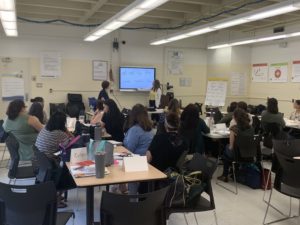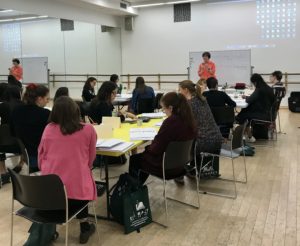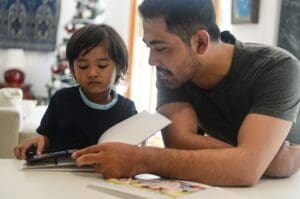by Sharon Pacuk
I have a confession. I am awful at teaching my own children.
And while this might not seem like something I should be riddled with shame about, consider that I am also a professional educator, and I make my living teaching kids how to read, write, and communicate.
A funny thing happens when you are a parent of school-aged children and also a speech-language pathologist and Orton-Gillingham practitioner. Everyone assumes you are following your children around tiger-mom style, flash cards of Latin roots falling out of your pockets while you quiz them on the eight different ways to spell long “e,” after which they pull their lanky limbs into their pajamas before drifting off to dream about etymology. People expect your children to be reading at four and to have perfect pronunciation. I once asked a fellow speech-language pathologist, Do you think my four-year-old’s inability to say “clementine” (He says “lemon-time.” It is adorable. Trust me.) is equivalent to a negative Google review for my private practice? As in, does my inability to whip that cluster reduction into shape in my own preschooler amount to a dark stain on my credentials? I was mostly serious.
At the same time, my children–my nine-year-old especially– do not want to be taught by their mother. My nine-year-old wants unfettered access to my sand trays and my chalk pens and my colorful sticky notes, which you would think were a valuable currency from the way he begs for them. But he does not want me to sit next to him and list out my three strategies for improving topic sentences.
I once came out of my home office rolling my portable white board towards him while gesturing excitedly at my lesson on semicolons when he booed me. He actually said, Booooo, like I was the 254th seed in a tennis tournament that had just managed to beat the beloved worldwide star. I am pretty sure he once tried to mute me when I was telling him about the chameleon prefix “con,” except we weren’t on Zoom. I was sitting next to him at dinner.
I think about this whenever I have consultation phone calls with prospective parents and they are wondering how they can get their child to read more at home, or when I am listing home practice activities to give to the working parents of an Orton-Gillingham student. The last thing parents need are lists of unachievable, burdensome demands. We, as educators, work not just with the student as a whole but with whole families. The impact of a speech, language, or reading disorder is felt across the entire family unit. While most of our time is spent with the child, we have a responsibility to educate and individualize our support of families, just as we do for our students.
With that in mind, here are tips for how to help families support language and literacy skills at home:
Teach parents how to fold learning into existing routines.
There is a well-known consensus that, for young children, language development is best facilitated during the course of daily routines. This can also be applied to literacy. Embedding learning into everyday contexts not only helps parents follow through on home practice, but it also helps reluctant kids experience learning as something that is part of their family’s time together rather than an extra, unwanted task they are forced to do.
For young kids
- Play with a purpose. Children are naturally engaged and excited by learning new ideas and concepts. Embedding learning in play is motivational for young children, but parents need to be taught how to play with a purpose in mind. For example, if a student needs to work on phonological awareness skills (i.e., the ability to identify and manipulate the sounds in spoken language, which is the foundation for early literacy development), give parents a list of play ideas that will help achieve this goal.
Vehicle play naturally lends itself to working on segmenting words into sounds. Parents can give their child a word and then have the train pause at the “train stops” where children segment each individual sound (e.g., “bat” → /b/ /a/ /t/). To work on vocabulary and concepts, you can have the cars go fast and then slow. They can skid, glide, sputter, and coast. Model the new vocabulary by pairing it with the movement of the cars. Repeat the new word naturally and often in the course of play. (“Can you make your car skid?” and “Wow! Look at your car glide!”).
Commuting and trips to the store are the perfect environments for I Spy games. There are so many ways in which a simple game of I Spy can be adapted to work on a particular skill. Model for parents how to play rhyming or initial sound I Spy. (“I spy with my little eye something that starts with the /s/ sound!”).
Doll, kitchen, and other pretend play can be incorporated with teaching vocabulary and prepositional words (“Let’s put the doll under the bed to sleep!”). To work on blending sounds into words, parents can play “Silly Restaurant,” where you can only order food by breaking up a word that the child then has to blend to understand (“To start, I would like to have the /e/ /g/ /z/, please”).
To help a young child start to identify the beginning sounds in words, you can play alliteration games during dress up. Put on a costume and turn yourself into a silly character. (“Hello! I am Sally the superhero. I only eat sausage and salad. I love to sing!”). Help your child do the same with their characters by asking them prompting questions: What is your name? What do you eat? What do you like to do? Help them come up with words with the same initial sounds.
For older kids
- Take advantage of commuting time. Have parents make a routine of always bringing along sight words to work on in the car or in public transportation. Make a note for parents of quick, portable activities that are easy to work on during commutes. Focus on activities that require repetition–like sight words–for storage in long-term memory.
- Take advantage of a child’s love of technology. Have students record an audiobook version of the controlled text they are reading on their tablets (and have them do all of the character’s voices). Take the sentences you would like them to read for homework and put them in a Wordwall.net game individualized to their interests. If homework is a reading game on a screen, technology-loving children hardly notice that they are practicing target skills.
Keep it manageable.
If you give too much work to be completed at home, there is a good chance that none of it will be done. Smaller, discrete tasks are more manageable for families navigating the busyness of everyday life. Give an estimate of how long a task might take to help parents plan their evenings. Highlight the activities that are the most important to focus on if they find their time in the week is especially limited.
Keep it multisensory.
If you spend your Orton-Gillingham lesson engaging the auditory, visual, and kinesthetic learning pathways and then give parents a stale, boring worksheet for them to complete with their child at home, you are setting them up for a struggle. Teach parents to incorporate the multisensory principles of Orton-Gillingham at home as well. Give them a short list of tools to have on hand, such as a tracing mat or a tray to fill with beans or sand. Teach parents–just as you do your students–how to integrate the auditory, visual, and kinesthetic modalities in their child’s home practice.
Keep parents informed.
Parents need to know not just the how but the why of what you are asking them to do at home. Explain how automaticity is best achieved through repeated, consistent practice. If a student still needs to develop automaticity with letter-sound correspondence, for example, explain how just five minutes of daily practice with their card deck will help them build the connections in their brain needed to gain fluency with this vital skill.
Eighteen months of remote and hybrid learning has left many parents exhausted by the very idea of working with their child at home. It has also left children eager to get back to the days when their teachers were their teachers and their parents were their parents and never the twain shall meet. So, allow parents to roll those white boards back into their home offices. Their children will learn about semicolons some other day. Be thoughtful about the home practice you assign and empower parents with the know-how to foster their children’s learning in a way that–just maybe–won’t get them booed.
We are so thrilled to announce that Sharon will be joining our team at Edwards Orton-Gillingham this fall! Look for more blogs by Sharon and the rest of the EOG team.
Sharon Pacuk is a licensed speech-language pathologist and Orton-Gillingham specialist with over 10 years of experience. Her methodology combines a deep knowledge of the structures of language with a gold-standard literacy approach to build skillful and passionate readers, writers, communicators, and thinkers.






